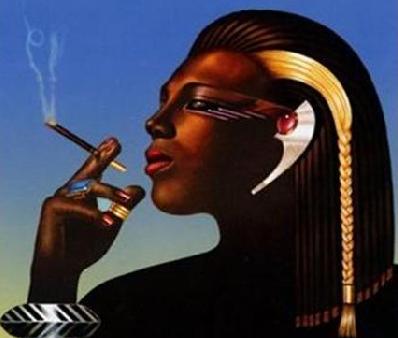SYLVESTER, American Cockette superstar and disco singing queen, born (d: 1988); A superstar, Sylvester represented the Black and Gay cultural origins of disco to mainstream America and made the success of RuPaul’s possible. His body of work includes crucial contributions to the disco songbook, but his ballads proved he was a versatile stylist who brought an immediacy and depth to all material.
Sylvester James was born in Los Angeles to a family that included the blues singer Joan Morgan. After moving to San Francisco, where he was one of the stars of the gender-fuck drag street troupe The Cockettes, Later in the 1970’s, Sylvester put together the rock-oriented Hot Band. He began recording for the Blue Thumb label but sales were disappointing. Returning to San Francisco, he began to build up a loyal audience with his outrageous stage shows.
Harvey Fuqua, one-time producer at Motown but now a scout for Fantasy Records saw Sylvester and signed him to begin work on an album. In a stroke of luck, Izora Whitehead and Martha Wash were discovered singing background vocals at a concert and Sylvester jumped at the chance to hire them. Renaming the hefty pair the Two Tons of Fun, they were an integral part of Sylvester’s success, adding stage presence as well as reminders of his gospel roots.
The self-titled Fantasy debut, Sylvester, dropped in 1977 without much fanfare but gained cult status via the remake of the Ashford and Simpson’s “Over and Over.”
His greatest achievement would be Step II. As the LP was being recorded, Sylvester let Patrick Cowley, then an up and coming remixer, hear an early version of “You Make Me Feel Mighty Real.” Cowley’s synth overlays transformed the former ballad into a disco tour de force. The driving beat and keyboard flourishes reflected the intensity of Gay disco at its best, while Sylvester’s impassioned vocals communicated the anticipation of sex. Arriving at the height of discomania, the combination proved irresistible and much to the horror of disco haters and homophobes (who were largely one and the same), he was launched into the mainstream. The accompanying video made a mockery of Fuqua’s attempts to tone down his flamboyance, as Sylvester strolled around a disco in full drag.
“Mighty Real” won several Billboard disco awards, establishing Sylvester in disco’s pantheon. The other single from the album, “Dance (Disco Heat),” featured the Tons on lead vocals and their pure gospel was so spirited, so powerful that all Sylvester could do was come in halfway through the song with a scream that anybody familiar with the black church will recognize as the “happy shout.”
Despite the obvious magic he had with dance material, Sylvester never viewed himself as a disco act. You see, he really wanted to be Patti Labelle. Therefore, he announced that Stars would be his only pure disco album. A celebration of nightlife, the four tracks dared you to sit down as he and the Tons worked the hell out of “I Who Have Nothing.”
Although most disco acts avoided live albums, Sylvester was at his strongest on stage. Taking advantage of his exciting stage performance, the live album Living Proof was released in late 1979 to the delight of fans. Recorded at San Francisco’s War Memorial Opera House, the album is a tour de force. Ranging from his disco hits to an interpretation of Billie Holliday’s Lover Man, it is a powerful statement of Sylvester’s talent.
Sylvester began the 1980’s on the Disco chart with Can’t Stop Dancing, a track from Living Proof. Midway through the year, Two Tons O’ Fun branched off on their own and topped the Disco chart with their first album. Late in the year Sylvester released the album, Sell My Soul. Harvey Fuqua had suggested he branch out into a wider variety of music as Disco’s popularity began to fade. Recorded without Patrick Cowley, the single I Need You failed to make the Disco Top 5.
By 1981, Sylvester returned to working with Patrick Cowley and contributed vocals to Cowley’s Disco hit Menergy. He also contributed vocals to Herbie Hancock’s top 10 Disco hit Magic Number. One of his last collaborative efforts with Patrick Cowley was Do You Wanna Funk, a Top 3 Dance hit in the fall of 1982. The album All I Need in 1983 kept Sylvester’s voice prominent in dance clubs. Unfortunately, Patrick Cowley became one of the first victims of the AIDs epidemic and Sylvester’s music never completely recovered. 1984’s Call Me suffered from lack of strong production.
Sylvester didn’t return to the Dance top 10 until 1985 with Take Me to Heaven and Sex from the album M1015. For his next album, 1987’s Mutual Attraction, Sylvester finally signed with a major label, Warner Brothers. His remake of Stevie Wonder’sLiving For the City and Someone Like You were major Dance hits. The latter became his second chart-topping Dance hit. Sadly, this was to be his only full-length studio album recorded for Warner Brothers. Sylvester succumbed to AIDs in December 1988.
